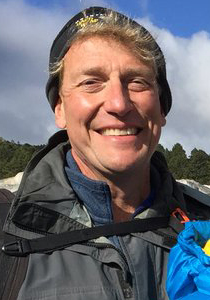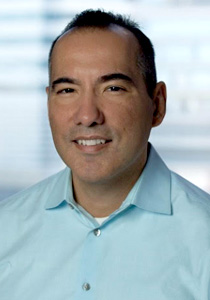Learn about IGB research, hear about current issues in the life sciences, and connect with other students on campus at the annual Fellows Symposium. This full-day event, sponsored by the Carl R. Woese Institute for Genomic Biology, is also your chance to share your research at the popular Poster Session and reception.
Register here to attend the IGB Fellows Symposium. Registration will close on April 27. For inclusion in the program posters must be submitted by April 26.
Featuring a talk from special guests

Bruce Fouke
Professor, Department of Geology and Department of Microbiology
University of Illinois at Urbana-Champaign
"Life Makes Rock: The Curious Case of Human Kidney Stones"
Bruce Fouke is a Professor in Geology, Microbiology, and the Carl R. Woese Institute for Genomic Biology, at the University of Illinois Urbana-Champaign. He also serves as Director of the Illinois Roy J. Carver Biotechnology Center. Bruce completed his B.Sc. at Bradley University, M.Sc. degrees at the University of Iowa and the University of Chicago, and his Ph.D. at Stony Brook University. He then went on to complete postdoctoral appointments at the Free University Amsterdam, the University of California Berkeley, and Exobiology at NASA Ames Research Center. He was recently chosen as the American Association of Petroleum Geologists (AAPG) Roy M. Huffington Distinguished Lecturer for the Asia-Pacific Region, during which he presented lectures in India, Japan, China, Vietnam, Australia and New Zealand. Bruce has held professorships at Lund University, Sweden, and the Illinois Center for Advanced Studies, and has active adjunct faculty appointments at the Thermal Biology Institute at Montana State University, and the Caribbean Research and Management of Biodoversity Laboratory on Curaçao. He serves on multiple science panels at NSF, DOE, NASA and the European Science Foundation. Results from his scientific research have been reported on in National Geographic, the New York Times, and National Public Radio.
The Fouke laboratory research group focuses on the cross-disciplinary intersection of geology and molecular microbiology (Geobiology), with emphasis on the emergence and survival of Life within the context of dynamic Earth processes. Results have direct application to a wide variety of pressing societal interests that range from energy and human medicine to environmental sustainability and space exploration. Their active research projects include studies of: (1) applications of sedimentology, geochemistry and molecular microbiology to oil and gas exploration and production; (2) quantification of the rate, mode and tempo of microbial evolution in response to steep gradients using a microfluidic test bed called the GeoBioCell; (3) the control of sea surface temperature on coral reef ecosystems, coral skeleton synthesis and the global emergence of infectious marine diseases; (4) the response of heat-loving (thermophilic) bacteria to changes in hot-spring flow rate, chemistry and temperature; (5) the timing and hydrology of the last flow of water in ancient Roman aqueducts; and (6) understanding human kidney stone formation with integrated geobiology approaches.
 Benjamin Garcia
Benjamin Garcia
Presidential Professor of Biochemistry and Biophysics
Perelman School of Medicine
University of Pennsylvania
"Quantitative Proteomics for Understanding Modified Proteins And Proteomes"
Dr. Benjamin A. Garcia received his B.S. in Chemistry from UC Davis in 2000, where he was an undergraduate researcher with Prof. Carlito Lebrilla and was first introduced to the field of mass spectrometry. He was also a summer undergraduate researcher at Caltech with Prof. Jack Beauchamp (1999), and a research associate at Sequenom, Inc. (2000-2001). Dr. Garcia received his PhD in Chemistry from the University of Virginia under the supervision of Prof. Donald Hunt (2005), and then was an NIH NRSA Postdoctoral Fellow at the University of Illinois with Prof. Neil Kelleher (2005-2008). In 2008, Dr. Garcia was appointed as an Assistant Professor at Princeton University until his recruitment as the Presidential Associate Professor of Biochemistry and Biophysics, and Faculty Director of the Quantitative Proteomics Resource Core at the University of Pennsylvania School of Medicine in 2012, and was promoted to full Professor in 2016. Ben is a member of the Biochemistry and Molecular Biophysics (BMB), Genomics and Computational Biology (GCB), Cell and Molecular Biology (CAMB) and Pharmacology (PGG) graduate groups at Penn Medicine. Currently, he is also the BMB Chair of Graduate Admissions and Vice Chair of the BMB graduate program. Lastly, Ben is highly passionate about encouraging and supporting diversity and younger underrepresented minority scientists. He is currently the Director of Diversity Recruitment for the Penn BMB Program, serves as a faculty advisor for both the PennPREP Program and the Society for the Advancement of Chicanos and Native Americans in Science (SACNAS) UPenn Chapter, and serves on the American Society for Mass Spectrometry (ASMS) Diversity and Outreach committee.
Dr. Garcia’s interest has focused on developing novel mass spectrometry based approaches and computation for interrogating protein modifications, especially those involved in epigenetic mechanisms. One longstanding main interest is in understanding the dynamics of histone PTMs during cellular differentiation and disease by combining cell biology, genomics and biochemical techniques with quantitative Bottom Up, Middle and Top Down proteomics. His work has resulted in over 230 publications. He has also been recognized with numerous honors including the American Society for Mass Spectrometry (ASMS) Research Award, a National Science Foundation CAREER Award, the NIH Director’s New Innovator Award, the Presidential Early Career Award for Scientists and Engineers (PECASE), an Alfred P. Sloan Fellowship, an AB Sciex Young Investigator Award, an Agilent Thought Leader Award, the Biomed Research Central Award in Molecular and Cellular Sciences, the PITTCON Achievement Award, the Enabling Proteomics Technologies Ken Standing Award, the Leukemia and Lymphoma Society Dr. Robert Arceci Scholar Award, the Protein Society Young Investigator Award, and the American Chemical Society Arthur F. Findeis Award.
Dr. Garcia is on the editorial board of the Molecular and Cellular Proteomics (MCP) journal, serves on the Editorial Advisory Board for the Analytical Chemistry journal and also served as an Associate Editor for BMC Genomics (2010-2017). He also serves on the Board of Directors for the U.S. Human Proteome Organization (HUPO), and has served on the ASMS Nominating committee and the ASMS Asilomar Conference committee. Ben was also elected to the HUPO governing Council (Western Region Representative) in 2016. He has chaired several scientific sessions or workshops at many conferences including US and World HUPO, ASMS, and ABRF. Dr. Garcia participated in the Peptide and Protein Identification Guidelines meetings for MCP, and served as a guest co-editor for a special MCP issue focused on Chromatin Biology and Epigenetics. He has also been profiled in an ASBMB Research Spotlight. Ben is also currently the secretary for the Delaware Valley Mass Spectrometry Discussion group. He has served on many NIH, NSF and other grant review panels, and is currently a permanent member of the Enabling Bioanalytical and Imaging Technologies (EBIT) NIH study section. Ben has also participated in Capitol Hill Day speaking to congressional representatives about continuing federal funding of scientific research. Dr. Garcia has also collaborated or consulted for Genentech, Eli Lilly, Pfizer, GSK, Amgen, Constellation, Abbvie, BMS and Novartis. The Garcia Lab has a Technology Alliance Partnership with Thermo Scientific, and they have also named him as a Thought Leader in the proteomics field.
Registration is free and lunch is provided. For full details and to register to attend and submit a poster, visit https://fellows.igb.illinois.edu/.
